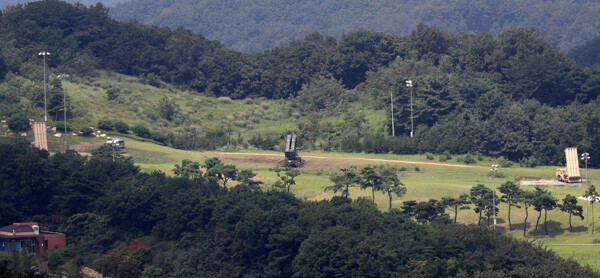hankyoreh
Links to other country sites 다른 나라 사이트 링크
South Korea may be forced to pay for THAAD operation and maintenance

The US military may demand that operation of the THAAD system be paid for with USFK defense funds supported by the South Korean government, Minister of National Defense Song Young-moo said on Feb. 20. At hearing of the National Assembly’s National Defense Committee that day, Song responded to Liberty Korea Party lawmaker Kyeong Dae-soo’s question on whether there was a possibility that the US might demand South Korea pay for THAAD battery costs as part of its share of defense expenses.
“That is a possibility,” Song replied.
Song’s remarks gave voice to concerns that the US may demand South Korea pay for THAAD battery operation costs during negotiations on the next distribution of defense costs with the US, which are to take effect in 2019. This was a different story from the preceding Park Geun-hye administration’s claims that Status of Forces Agreement (SOFA) provisions assigned South Korea responsibility for providing a site and infrastructure, while the US paid for the THAAD rollout and the system’s operation and upkeep.
If THAAD battery costs are assigned to South Korea as part of its future share of defense expenses, it would leave it responsibility not only for the THAAD site but also costs for its operation and maintenance.
On the matter of the fast-approaching negotiations with the US on the next defense cost distribution, Song explained, “Working level officials with the Ministry of National Defense and the Ministry of Foreign Affairs are holding strategic meetings on whether a total amount or a need-based approach would be more beneficial, but no final decision has been reached.”
A total amount approach would mean negotiating a total share of necessary USFK stationing costs to be provided by the South Korean government, while a need-based approach would involve basing the share of defense costs on the amount needed for USFK to actually maintain combat capabilities. In the past, South Korea has adopted the total amount approach in its negotiations, while Japan has used the need-based approach. In 2017, South Korea paid 950.7 billion won (US$884.2 million) in stationing costs to USFK as its annual share of defense expenses.
By Park Byong-su, senior staff writer
Please direct questions or comments to [english@hani.co.kr]

Editorial・opinion
![[Guest essay] The real reason Korea’s new right wants to dub Rhee a founding father [Guest essay] The real reason Korea’s new right wants to dub Rhee a founding father](https://flexible.img.hani.co.kr/flexible/normal/500/300/imgdb/original/2024/0423/8317138574257878.jpg) [Guest essay] The real reason Korea’s new right wants to dub Rhee a founding father
[Guest essay] The real reason Korea’s new right wants to dub Rhee a founding father![[Column] ‘Choson’: Is it time we start referring to N. Korea in its own terms? [Column] ‘Choson’: Is it time we start referring to N. Korea in its own terms?](https://flexible.img.hani.co.kr/flexible/normal/500/300/imgdb/original/2024/0423/3617138579390322.jpg) [Column] ‘Choson’: Is it time we start referring to N. Korea in its own terms?
[Column] ‘Choson’: Is it time we start referring to N. Korea in its own terms?- [Editorial] Japan’s rewriting of history with Korea has gone too far
- [Column] The president’s questionable capacity for dialogue
- [Column] Are chaebol firms just pizza pies for families to divvy up as they please?
- [Column] Has Korea, too, crossed the Rubicon on China?
- [Correspondent’s column] In Japan’s alliance with US, echoes of its past alliances with UK
- [Editorial] Does Yoon think the Korean public is wrong?
- [Editorial] As it bolsters its alliance with US, Japan must be accountable for past
- [Guest essay] Amending the Constitution is Yoon’s key to leaving office in public’s good graces
Most viewed articles
- 1[Guest essay] The real reason Korea’s new right wants to dub Rhee a founding father
- 2Terry Anderson, AP reporter who informed world of massacre in Gwangju, dies at 76
- 3Why Korea shouldn’t welcome Japan’s newly beefed up defense cooperation with US
- 4[Column] ‘Choson’: Is it time we start referring to N. Korea in its own terms?
- 5Senior doctors cut hours, prepare to resign as government refuses to scrap medical reform plan
- 6Opposition calls Yoon’s chief of staff appointment a ‘slap in the face’
- 7[Column] The clock is ticking for Korea’s first lady
- 8New AI-based translation tools make their way into everyday life in Korea
- 9[Editorial] Japan’s rewriting of history with Korea has gone too far
- 10[Column] Are chaebol firms just pizza pies for families to divvy up as they please?